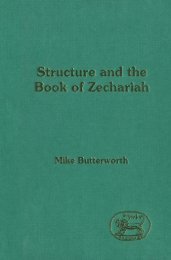Appendix CASE ONE - Collection Point® | The Total Digital Asset ...
Appendix CASE ONE - Collection Point® | The Total Digital Asset ...
Appendix CASE ONE - Collection Point® | The Total Digital Asset ...
You also want an ePaper? Increase the reach of your titles
YUMPU automatically turns print PDFs into web optimized ePapers that Google loves.
44 Legal History in the Making<br />
the exact meaning to be attached to the words 'malice prepense', or 'malice<br />
aforethought' in the leading statute of 1390 and the century following. In<br />
simple terms the question has been in what circumstances, if any, did 'malice<br />
aforethought' carry its obvious and literal meaning of premeditation, and<br />
when did it merely signal a deliberate and intentional killing - one committed,<br />
it may be, on the spur of the moment without premeditation. <strong>The</strong> answer to<br />
this question affects an understanding of the later development of the law of<br />
homicide in England, and in particular the rise of the distinction between<br />
murder and manslaughter, and the relationship between both these terms and<br />
the concept of 'chance medley'.<br />
It would be both impertinent and unwise for a Scots lawyer to intervene<br />
in the English debate, medieval or modern. So far as the modern law is<br />
concerned the Scottish witnesses who gave evidence to the Select Committee<br />
declared, virtually without exception, that they were satisfied with the existing<br />
position under Scottish common law, and were against the drafting of a new<br />
statutory definition of the crime of murder for Scotland. Sheriff Gordon,<br />
indeed, the author of the leading modern work on Scots criminal law,<br />
professed himself puzzled at the need to consider the Scottish definition<br />
of murder at all. It was 'almost impossible for a Scottish judge to go astray<br />
when directing a jury on the mens rea of murder'. 9 All he had to do was<br />
to quote the classic definition of murder in Macdonald's Criminal Law,<br />
'Murder is constituted by any wilful act causing the destruction of life,<br />
whether intended to kill, or displaying such wicked recklessness as to imply<br />
a disposition depraved enough to be regardless of the consequences'. 10 <strong>The</strong><br />
Select Committee recommended a new statutory definition of the crime of<br />
murder for England but, noting the strength of the Scottish evidence in favour<br />
of the existing common law, concluded that however desirable uniformity of<br />
definition might be in theory they 'could not justify the imposition on Scotland<br />
of changes which would be so unwelcome'. 11 <strong>The</strong>y also noted that statutory<br />
definition of 'the elusive concept of "wicked recklessness'" would be very<br />
difficult, and considered that 'that very flexibility of "wicked recklessness"<br />
which is seen as its virtue in Scotland precludes the use of precise and definite<br />
language which is normally and rightly expected in a statute defining a criminal<br />
offence'. 12<br />
This essay considers the historical development of the classification of<br />
homicide in Scotland, with particular reference to the use of the term<br />
'forethocht felony', the native Scottish equivalent of the English lawyer's<br />
9 Select Committee Report, in, 553.<br />
10 J.H.A. Macdonald, A Practical Treatise on the Criminal Law of Scotland, 5th ed. (Edinburgh,<br />
1948), 89. Macdonald, who subsequently became Lord Justice-Clerk, was thirty years old when he first<br />
framed this definition in 1866.<br />
11 Select Committee Report, i, para. 42.<br />
12 Ibid., para. 43.






